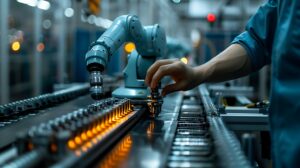Today’s environmental and social challenges need a team effort from everyone—governments, businesses, NGOs, and consumers.
Konica Minolta takes its ESG responsibilities seriously. We aim to keep evolving and innovating, contributing to sustainable growth for society and individuals, guided by our ESG framework.
To further our commitment, we have redefined five material issues that we aim to address by 2030 to contribute to solving social challenges:
- Improve work and corporate dynamism
- Use limited resources effectively
- Address climate change
- Support healthy, high-quality living
- Ensure social safety and security
By focusing on these key areas, we strive to create a positive impact on society and the environment, ensuring that our operations align with global sustainability goals.
Companies are under increasing pressure to align with environmental, social, and governance (ESG) principles to meet regulatory standards and satisfy growing consumer demand for responsible operations.
But how can manufacturers adapt to these demands with a clear focus on sustainable growth?
This article explores ESG in manufacturing and how cobot solutions can help manufacturers align with ESG principles.
Environmental Benefits of Cobot Automation
Let’s explore how cobots contribute to a greener footprint.
Implementing cobot solutions can lead to substantial environmental gains, addressing energy efficiency, waste reduction, and emission control in manufacturing processes.
1. Energy Efficiency
Cobots, or collaborative robots, are engineered for energy efficiency, making them a sustainable choice for modern manufacturing.Unlike traditional industrial robots, which often require significant power to operate, cobots work alongside humans performing tasks that demand less energy. Their energy-efficient motors and advanced control systems ensure that they use only the necessary amount of power for each task.
2. Reduced Waste
Cobots can perform tasks with precision, reducing mistakes that lead to material waste. For instance, in the automotive industry, cobots are used for precise painting and welding tasks, ensuring consistent quality and reducing the need for rework.
The repeatability of cobots ensures that each product or component is manufactured to the same high standard, further reducing waste associated with defects or deviations.
3. Lower Emissions
Cobots consume less energy than traditional robots and manual processes, contributing directly to lower greenhouse gas emissions
The energy savings from using cobots translates into reduced demand for electricity, which, in turn, decreases emissions from power plants.
Cobots can be easily integrated into manufacturing systems powered by renewable energy sources, such as solar or wind power. This combination further amplifies the environmental benefits by cutting down on the reliance on fossil fuels.
Social Advantages of Cobots
Cobots offer several social benefits that align with modern manufacturing’s ethical and workforce-related goals.
Let’s examine how they improve worker safety, support job creation and upskilling, and promote ethical labor practices
Improved Worker Safety
Cobots play a crucial role in improving worker safety by taking on hazardous and repetitive tasks that are prone to accidents and injuries.
Their ability to work alongside humans allows them to handle dangerous materials, operate in high-risk environments, and perform ergonomically challenging tasks, thus reducing the potential for workplace injuries.
Job Creation and Upskilling
Far from replacing human workers, cobots often create new job opportunities and support workforce development.
As cobots take over routine and physically demanding tasks, workers can shift to roles that require more complex problem-solving and decision-making skills.
Companies can invest in training programs that equip workers with the skills needed to manage and optimize cobot operations, leading to a more skilled and versatile workforce.
Promoting Ethical Labor Practices
Integrating cobots into manufacturing processes can also promote ethical labor practices by ensuring fair labor conditions and improving overall workplace quality.
Cobots help alleviate labor shortages and reduce the reliance on overworking employees, contributing to more balanced work schedules.
They also support initiatives aimed at reducing worker exploitation by taking over tasks that are often outsourced under poor labor conditions.
Governance and Compliance Through Automation
Cobots boost environmental and social aspects of manufacturing and strengthen governance by streamlining compliance and improving transparency.
Here’s how cobots contribute to better governance and adherence to ESG standards.
Streamlined Reporting and Monitoring
Cobots can play a pivotal role in maintaining compliance with ESG reporting requirements.
They facilitate accurate and continuous data collection on various operational metrics, which can be seamlessly integrated into ESG reporting systems.
Automated data capture ensures precision and consistency, reducing the risk of human error and improving the reliability of compliance reports.
Tools and Software for Tracking ESG Metrics
Several advanced tools and software solutions are available that integrate with cobots to track ESG metrics.
These systems can monitor energy use, emissions, waste, and other key indicators, providing real-time insights and generating comprehensive reports for regulatory compliance and stakeholder communication.
Transparency and Accountability
Cobots improve transparency in production processes by collecting and analyzing data on various aspects of manufacturing.
This capability supports better decision-making and accountability by providing clear insights into operational performance and areas for improvement.
Cobots can track detailed information on production rates, resource usage, and process efficiency, contributing to a transparent view of the entire manufacturing workflow.
Improving Transparency Through Data Collection
By continuously collecting data, cobots create a trail of operational information that can be used to audit processes and verify compliance with ESG standards.
Analytics tools can then process this data to provide actionable insights, identify trends, and highlight discrepancies, ensuring that manufacturing practices align with governance requirements and ethical standards.
How Konica Minolta’s Cobot Solutions Align with ESG Standards
Konica Minolta offers a series of cobot solutions that automate visual quality inspection and manual workflows in different industry segments. Here’s an overview of our customer-centric cobot systems and how they align with ESG principles.
Konica Minolta’s Cobot Solutions
Our cobot systems are designed to meet diverse manufacturing needs, combining advanced technology with user-friendly interfaces to improve efficiency and quality in production.
- CoboSense: Konica Minolta, in collaboration with an automotive client, developed CoboSense to automate visual quality inspections. Launched in April 2020, the initial prototype combined a cobot with market-leading color sensors from Konica Minolta. The upgraded CoboSense 2.0 features improved testing capabilities.
CoboSense allowed the manufacturer to significantly improve their surface testing processes. As a result, testing time was reduced from 17 minutes to less than 7 minutes per sample, leading to a cost reduction of over four times. As well as a doubling of testing capacity, and the resolution of personnel and material issues. This created new ESG value by improving resource efficiency and reducing the need for manual labor. For more information, visit Konica Minolta CoboSense.
- FORXAI Cobot: By integrating AI and machine vision with quality assurance and pick-and-place tasks, FORXAI Cobot streamlines workflows and improves operational efficiency. This system supports better governance by enabling real-time data tracking and analysis, which aids in compliance with ESG reporting requirements. Learn more about FORXAI Cobot…
- CoboVox: Konica Minolta’s voice-enabled cobot programming application, makes it easier for workers to operate cobots without extensive technical training. This improves worker safety, job satisfaction and upskilling, contributing to social advantages in the workplace. Learn more about CoboVox…
- Autonomous Material Handling (AMH) Solutions: Featuring Autonomous Mobile Robots (AMRs) and proprietary fleet management software, these solutions optimize material flow and intralogistics efficiency for 24/7 operations. They enable real-time tracking and improve accuracy and efficiency in tasks such as picking, putaway, and transportation, reducing energy use, hands-on work, and environmentally harmful emissions. Learn more about our AMH solutions…
Ready to see how cobot solutions can help you meet your ESG goals? Book a free, no-obligation consultation call with our experts today to explore tailored solutions for your business.



